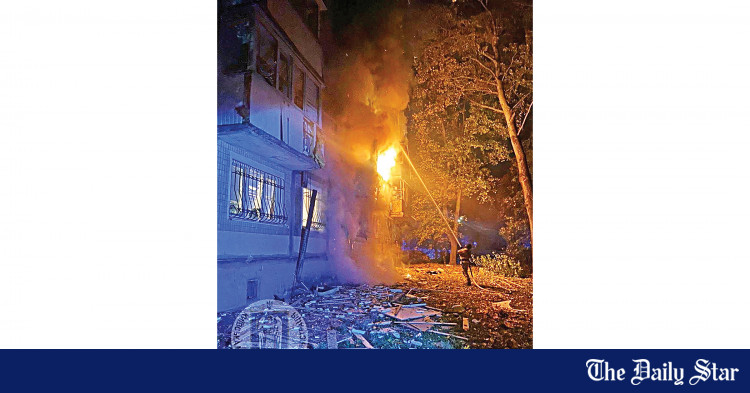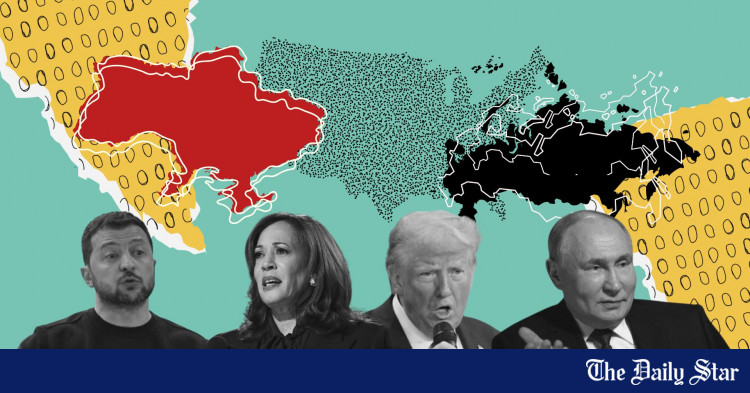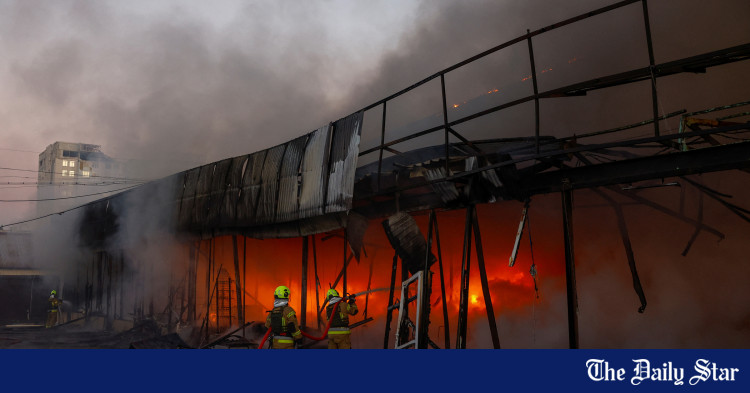US election outcome’s likely impact on the Russia-Ukraine war
The US support for Ukraine is part of a strategy to counter Russian influence and maintain a balance of power in the region
VISUAL: ALIZA RAHMAN
"Without Ukraine, Russia ceases to be a Eurasian empire. Russia without Ukraine can still strive for imperial status, but it would then become a predominantly Asian imperial state, more likely to be drawn into debilitating conflicts with aroused Central Asians, who would then be resentful of the loss of their recent independence and would be supported by their fellow Islamic states to the south."― Zbigniew Brzeziński
Zbigniew Brzeziński, a Polish-born American diplomat and political scientist, counsellor to Lyndon B Johnson from 1966 to 1968 and Jimmy Carter's national security adviser from 1977 to 1981 studied the complex geopolitical landscape of Eurasia and its significance in shaping global power dynamics. Brzezinski argued that control over this region is crucial for maintaining American dominance in his book, The Grand Chessboard: American Primacy and Its Geostrategic Imperatives. Following this argument, the US support for Ukraine is part of a strategy to counter Russian influence and maintain a balance of power in the region.
The Russia-Ukraine war began in February 2014, following Ukraine's Revolution of Dignity, which ousted the pro-Russian president Viktor Yanukovych. This revolution was triggered by Yanukovych's sudden decision to suspend the signing of an association agreement with the European Union (EU), favouring closer ties with Russia instead. This decision sparked widespread protests in Kyiv's Independence Square, known as Euromaidan, driven by a desire for closer integration with Europe, rejection of corruption, and a demand for democratic reforms. The situation escalated, leading to violence and the eventual ousting of Yanukovych in February 2014.
Russia responded by annexing Crimea and supporting pro-Russian separatists in the Donbas region. The conflict escalated dramatically in February 2022 when Russia launched a full-scale invasion of Ukraine, marking the bloodiest conflict in Europe since World War II.
The US has played a pivotal role in supporting the protests in Ukraine, with reports indicating that it has invested billions of dollars to promote democracy (read undermine Russia) in the country.
Crimea holds immense strategic value for Russia. It gives Moscow control over the Black Sea Fleet's base in Sevastopol, a warm-water port crucial for its naval operations. The port allows power projection in the Black Sea and beyond, enhancing Russian geopolitical influence. Crimea also has historical and cultural significance for Russia, with a majority ethnic Russian population.
From the start, Washington has supported Ukraine with billions in military, financial, and humanitarian aid. The Biden administration has maintained a firm stance against Russian aggression, emphasising the importance of defending democracy and the international order.
Donald Trump's dealings with Ukraine have been controversial. He was impeached during his presidency for allegedly pressuring Ukrainian President Volodymyr Zelenskyy to investigate Joe Biden and his son Hunter in exchange for military aid. Trump has also claimed that he warned Russian President Vladimir Putin against invading Ukraine, though these assertions are disputed. His relationship with Ukraine has been marked by scepticism and transactional diplomacy.
Hunter Biden's business dealings in Ukraine have been a focal point of political controversy. While serving on the board of Burisma, a Ukrainian gas company, Hunter Biden's role raised concerns about potential conflicts of interest. Critics argue that his position may have influenced US policy, though investigations have found no evidence of wrongdoing by Joe Biden. Nonetheless, the issue remains a point of contention in US politics.
Kamala Harris has also consistently supported Ukraine in its fight against Russian aggression. She has emphasised the importance of standing by Ukraine and maintaining strong alliances with NATO. Harris has condemned Russia's actions as "barbaric and inhumane" and has pledged to continue providing military and humanitarian aid. However, she has been cautious about committing to Ukraine's NATO membership, focusing instead on immediate support.
If Donald Trump secures the election, his approach to the Ukraine war could significantly shift. Trump has been critical of the scale of US support for Ukraine and has hinted at the possibility of negotiating a swift end to the conflict. His suggestions of reducing military aid and advocating for a settlement that might involve territorial concessions to Russia have raised concerns among Ukraine's allies about the potential weakening of Western support, adding a layer of uncertainty to the situation.
The endgame of the Ukraine war remains uncertain. Some analysts argue that a negotiated settlement is the most realistic outcome, given the current stalemate on the battlefield. However, any agreement would likely require significant compromises from both sides, including potential territorial concessions by Ukraine. A Trump victory could potentially lead to a more isolationist approach, significantly altering US foreign policy in the region.
The other issue is the possibility of a Russian nuclear attack, that significantly impacts White House policy. The Biden administration has made it clear that any use of nuclear weapons by Russia would have devastating consequences. This stance is rooted in the principle of nuclear deterrence, aiming to prevent escalation by making the costs of nuclear use prohibitively high. If elected, Kamala Harris and Donald Trump must navigate this delicate balance.
I will end this piece with another Brzeziński quote, "However, if Moscow regains control over Ukraine, with its 52 million people and major resources as well as its access to the Black Sea, Russia automatically again regains the wherewithal to become a powerful imperial state, spanning Europe and Asia."
Dr Sayeed Ahmed is a consulting engineer and the CEO of Bayside Analytix, a technology-focused strategy and management consulting organisation.



 www.newagebd.net
www.newagebd.net

 War Archive
War Archive









































